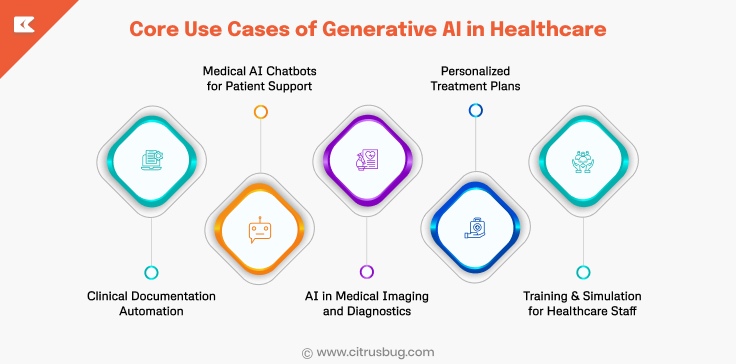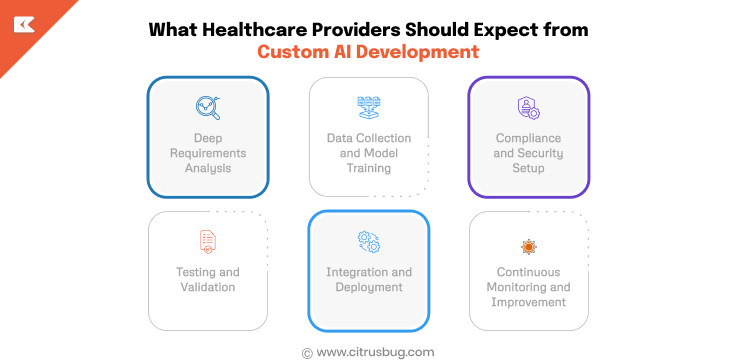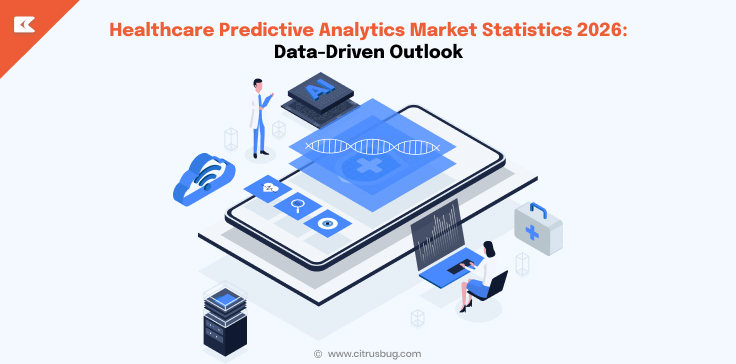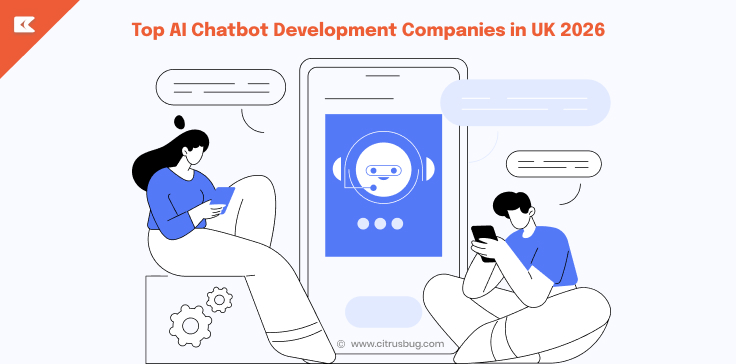Custom Generative AI Solutions for Healthcare Business: What to Expect
- June 18, 2025
-
1707 Views
- by Ishan Vyas
Table of Contents
- Understanding Generative AI in Healthcare
- Why Custom Generative AI Matters for Healthcare Providers
- Core Use Cases of Generative AI in Healthcare
- Pros and Cons of AI in Healthcare
- What Healthcare Providers Should Expect from Custom AI Development
- How to Choose the Right Tech Partner for Custom Generative AI Solutions
- Conclusion: Getting Started with Generative AI in Healthcare
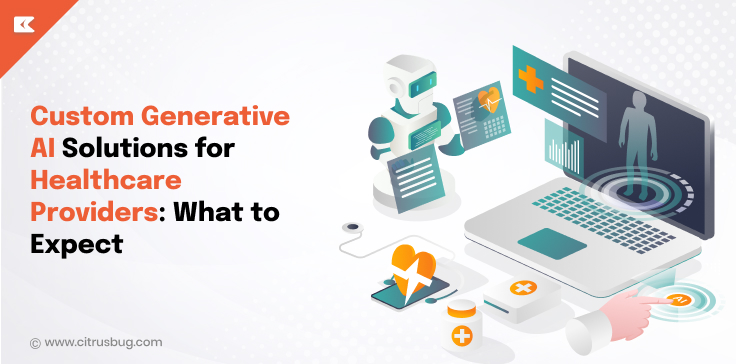
Artificial intelligence is a key factor driving the rapid transformation in the healthcare sector. AI has already had a discernible impact on everything from improving early diagnosis to expediting healthcare procedures. However, generative AI in healthcare is a new area that is attracting interest.
The phrase “generative AI” has likely been used a lot lately. It describes artificial intelligence (AI) systems that, using the knowledge they have gained from previously published material, are able to produce new text, images, and even data. Consider programs such as AI image generators or ChatGPT. Now, consider the use of this technology in the medical field. The potential is enormous.
Health care operators are focusing on custom-built generative AI solutions to enhance patient care, reduce administrative burden, and improve service personalization. With generative AI tools, healthcare operations are being enhanced by automating the summarization of clinical notes, implementing chatbots for answering patient queries, and even developing training materials for staff.
As the industry continues to explore this space, it’s clear that the use of generative AI aligns with broader AI trends in healthcare, from smarter automation to improved care coordination and decision-making support.
Understanding Generative AI in Healthcare
Fundamentally, generative AI is an artificial intelligence system that is capable of producing new content, be it text, images, audio, or even structured data, based on learning patterns from large amounts of data. In healthcare, what this implies is applying
You may be familiar with generative AI models such as ChatGPT or AI image generators. These models are trained on enormous datasets and can produce surprisingly human-like responses. When specifically optimized for the healthcare sector, these models can serve as strong assistants to both clinicians and administrative staff.
The role of generative AI is just one part of the broader AI landscape in healthcare. Depending on the problem at hand, healthcare providers may also rely on predictive analytics, computer vision, or machine learning algorithms. Understanding the different types of AI used in healthcare can help you determine where generative models offer the most value, and where other approaches may be better suited.
The following are some examples of generative AI in healthcare:
- Creating patient summaries from electronic health records (EHRs) to reduce physicians’ time.
- Developing training simulations for medical professionals using real-life cases.
- Constructing conversational medical AI chatbots that can respond to typical patient queries or walk them through post-care procedures.
- Generating synthetic medical data for research or training, particularly when actual patient data is scarce or sensitive.
What is particularly useful for healthcare is the capacity of generative AI to scale and tailor services. Rather than being all-encompassing, across-the-board, generative AI tailors to each hospital’s workflows, specialties, and patient populations, thus positioning it as a game-changer for healthcare payers and providers seeking to optimize efficiency and quality of care.
Why Custom Generative AI Matters for Healthcare Providers
Whereas off-the-shelf AI tools may be helpful, they tend to be inadequate for the precise requirements of healthcare providers. That is where customized generative AI enters the picture. By developing AI models that are customized to the specific workflows and data of a healthcare organization, providers can realize significantly more value and steer clear of potential threats.
Each healthcare practitioner operates slightly differently. From patient record maintenance to appointment scheduling, the processes and systems differ. An appointment-scheduling AI will not comprehend such intricacies. A bespoke generative AI solution can, however, be trained on your clinical data, documents, and workflows. This creates outputs that are not only more accurate but also more personalized to your team and your patients.
Data privacy is also a big consideration. In the healthcare AI sector, safeguarding confidential patient data is not optional. With bespoke AI development, you have the option of ensuring the solution meets industry specifications such as HIPAA and incorporates measures required to ensure privacy and security.
There’s also the benefit of integration without a hitch. A custom-built AI can connect directly with your EHR system, automate routine tasks such as appointment reminders, and even aid with medical billing. This kind of AI automation within healthcare increases efficiency without making your staff learn completely new tools and processes.
Bottom line, going custom is about getting an AI solution that works for you, not the other way around.
Core Use Cases of Generative AI in Healthcare
Generative AI in healthcare is no longer just experimental—it’s solving real, day-to-day challenges for care providers and patients alike. From streamlining administrative tasks to improving diagnostics and training, the technology is finding its place in meaningful, outcome-driven applications.
Many of these applications are part of a broader wave of innovation that’s reshaping how care is delivered. If you’re exploring this space, it’s helpful to look at some of the most relevant use cases of AI in healthcare that are already gaining traction.
Let’s walk through some of the most practical ways generative AI is making an imp
Clinical Documentation Automation
One of the most common pain points in healthcare is the amount of time physicians and nurses spend on paperwork. Clinical notes, discharge summaries, and progress reports take so much time that it could be devoted to patients.
With generative AI, doctors and nurses can just dictate or input key information, and the AI will create a neatly written medical report, freeing up hours each week. This not only increases productivity but also decreases burnout among healthcare staff.
Medical AI Chatbots for Patient Support
Medical AI chatbots are becoming increasingly popular in clinics and hospitals. These AI-powered chatbots can:
- Answer common patient questions (e.g., symptoms, medication instructions)
- Provide 24/7 support without human intervention
- Help schedule appointments or send reminders
- Assist with post-treatment care instructions
For healthcare providers, this translates to faster response times and reduced administrative load. For patients, it enhances convenience and satisfaction. Many healthcare organizations are now partnering with development teams that offer healthcare AI chatbot development services, ensuring these tools integrate seamlessly with clinical workflows while meeting privacy and compliance requirements.
AI in Medical Imaging and Diagnostics
Generative AI can help radiologists and pathologists by generating synthetic medical images for training or simulating rare conditions. It can also assist in enhancing diagnostic reports or auto-generating descriptions of imaging results based on scan inputs.
Such AI-based automation in healthcare not only speeds up the diagnostic process but also assists in training new professionals more efficiently.
Personalized Treatment Plans
Having access to a patient’s history, lab work, and preferences, generative AI is able to suggest individualized care plans. While the physician must always make the final decision, AI can help provide evidence-based treatment suggestions, highlight potential concerns, or run simulations.
This results in more informed care, less trial-and-error with treatments, and increased confidence in clinical decision-making.
Training & Simulation for Healthcare Staff
Teaching doctors, nurses, and technicians is costly and takes a significant amount of time and resources. However, Generative AI can create realistic patient simulations and quizzes for trainees, as well as simulate conversations with patients so they can practice in a safe environment.
The use of AI technology in medical content generation improves and further integrates theory with practice at all levels of education.
Pros and Cons of AI in Healthcare
Like any technology, AI in the healthcare industry comes with both benefits and challenges. Understanding the pros and cons of AI in healthcare is essential for providers who are considering integrating custom generative AI solutions into their systems.
Pros of AI in Healthcare
- Improved Efficiency
AI can automate repetitive tasks like documentation, appointment scheduling, and patient follow-ups. This frees up time for doctors and nurses to focus on patient care.
- Better Patient Engagement
Tools like medical AI chatbots allow patients to get quick answers to common questions, improving communication and satisfaction, without adding to the staff’s workload.
- Enhanced Diagnostics
AI can analyze medical data, imaging results, and patient records to assist doctors in making faster and more accurate diagnoses. It also helps in identifying patterns that might be missed manually.
- Cost Savings
Over time, AI automation in healthcare reduces operational costs by streamlining workflows, reducing errors, and minimizing the need for manual intervention in routine tasks.
- Scalable Solutions
Generative AI can be adapted for different departments, specialties, and patient needs, making it a scalable solution across hospitals, clinics, and private practices.
Cons of AI in Healthcare
- Data Privacy Concerns
AI tools rely on large amounts of patient data. If not properly secured, there’s a risk of data breaches or non-compliance with privacy laws like HIPAA.
- Bias in AI Models
If the training data is biased or limited, AI outputs may also be inaccurate or unfair, especially when used in diagnosis or treatment recommendations.
- Dependency on Technology
Overreliance on AI systems can be risky, especially if the technology fails or produces incorrect results. Human oversight is still essential.
- High Initial Investment
Building a custom generative AI solution requires upfront investment in development, training, testing, and compliance checks, which may be a barrier for smaller clinics or providers.
What Healthcare Providers Should Expect from Custom AI Development
Building a custom generative AI system is not a casual experiment; it is a strategic investment. Clinics looking to deploy a medical chatbot, streamline paperwork, or customize patient journeys do best when they enter the project with realistic milestones in hand.
Healthcare firms usually face three signature phases:
Deep Requirements Analysis
Every project begins with understanding your goals, workflows, data systems, and compliance requirements. Engaging a team with expertise in healthcare analytics consulting can help identify key data insights and operational bottlenecks early on. This step ensures developers can shape a solution that fits your exact needs, whether it’s reducing admin workload or improving patient interaction.
Data Collection and Model Training
To build a high-performing AI, developers use their real (or anonymized) healthcare data to train the model. The quality of this data matters a lot, especially in the healthcare industry, where accuracy is critical.
Developers may also use existing large language models and fine-tune them with your data to ensure better relevance and output quality.
Compliance and Security Setup
Your solution must follow healthcare regulations like HIPAA (in the US) or GDPR (in the EU). A good tech partner will implement strong data encryption, access controls, and privacy safeguards to keep patient data protected.
Testing and Validation
Before launch, the AI solution is thoroughly tested, both technically and clinically. You’ll want to validate the accuracy of responses (especially in medical AI chatbots or diagnostic tools) and ensure it works well with your existing systems.
Integration and Deployment
The AI solution is then integrated into your workflow, whether it’s your EHR, mobile app, internal portal, or website. This step should be seamless to avoid disrupting day-to-day operations.
Continuous Monitoring and Improvement
Once deployed, the AI system should be regularly monitored. Feedback from staff and users helps fine-tune the model over time, making it smarter and more reliable. Many providers also add human-in-the-loop (HITL) systems for extra assurance in sensitive cases.
While the development journey takes time, usually a few months, it leads to a fully customized, scalable AI tool that aligns with your goals and delivers long-term value.
How to Choose the Right Tech Partner for Custom Generative AI Solutions
Building a custom generative AI solution in healthcare isn’t something you can trust to just any software vendor. You need a tech partner who not only understands AI, but also respects the complexity, sensitivity, and regulations of the healthcare domain.
Here are a few things to look for when selecting the right healthcare software development company:
Healthcare & AI Expertise
Your development team should have proven experience in both AI technologies and healthcare software. Look for case studies, client testimonials, or sample projects that demonstrate their understanding of clinical workflows, EHR systems, and HIPAA requirements.
Focus on Data Security & Compliance
Patient data must be handled with care. Make sure your tech partner follows strict data protection protocols, offers secure infrastructure, and has a strong track record of building HIPAA- and GDPR-compliant solutions.
Customization & Flexibility
Avoid one-size-fits-all platforms. A good partner will take time to understand your specific needs and create a tailored solution, whether it’s an AI chatbot, a documentation assistant, or a smart triage system.
Seamless Integration
Your new AI solution should work with your existing software, not replace it entirely. Choose a company skilled in integrating AI with popular systems like EHRs, CRMs, or patient portals.
Citrusbug Technolabs focuses on providing tailored healthcare AI development & consulting services that meet your specific objectives and are secure. Our team employs a methodical and open approach, so whether you need assistance in exploring AI’s possibilities or if you need a solution developed from the ground up, we are with you every step of the way.
Conclusion: Getting Started with Generative AI in Healthcare
The impact of Generative AI on healthcare is already evident in the work processes of healthcare practitioners. From aiding in clinical documentation to engaging with medical bots and even providing tailor-made treatment plans, generative AI is increasingly becoming an indispensable asset in addressing the persistent challenges of healthcare.
The integration of AI is not simply adopting a new tool. It requires a thoughtful selection of options that meet your objectives. Custom design solutions provide the necessary flexibility, compliance, and control that healthcare providers desire to genuinely reap the benefits of AI implementation while maintaining data privacy and care standards.
Like with any innovation, success hinges on the right partner who has deep understanding of the pros and cons of AI in healthcare, knows the industry’s compliance landscape, and provides technologies that are scalable, safe, and impactful.
Here at Citrusbug Technolabs, we assist in the design and deployment of custom-made generative AI solutions for healthcare organizations that drive meaningful change. Our team stands ready to turn your AI automation ideas into reality, whether it is to enhance patient support or increase internal operational efficiency.





 SaaS Development
SaaS Development Web Application Development
Web Application Development Mobile Application Development
Mobile Application Development Custom Software Development
Custom Software Development Cloud Development
Cloud Development DevOps Development
DevOps Development MVP Development
MVP Development Digital Product Development
Digital Product Development Hire Chatbot Developers
Hire Chatbot Developers Hire Python Developers
Hire Python Developers Hire Django Developers
Hire Django Developers Hire ReactJS Developers
Hire ReactJS Developers Hire AngularJS Developers
Hire AngularJS Developers Hire VueJS Developers
Hire VueJS Developers Hire Full Stack Developers
Hire Full Stack Developers Hire Back End Developers
Hire Back End Developers Hire Front End Developers
Hire Front End Developers AI Healthcare Software Development & Consulting
AI Healthcare Software Development & Consulting Healthcare App Development
Healthcare App Development EHR Software Development
EHR Software Development Healthcare AI Chatbot Development
Healthcare AI Chatbot Development Telemedicine App Development Company
Telemedicine App Development Company Medical Billing Software Development
Medical Billing Software Development Fitness App Development
Fitness App Development RPM Software Development
RPM Software Development Medicine Delivery App Development
Medicine Delivery App Development Medical Device Software Development
Medical Device Software Development Patient Engagement Software Solutions
Patient Engagement Software Solutions Mental Health App Development
Mental Health App Development Healthcare IT Consulting
Healthcare IT Consulting Healthcare CRM Software Development
Healthcare CRM Software Development Healthcare IT Managed Services
Healthcare IT Managed Services Healthcare Software Testing services
Healthcare Software Testing services Medical Practice Management Software
Medical Practice Management Software Outsourcing Healthcare IT Services
Outsourcing Healthcare IT Services IoT Solutions for Healthcare
IoT Solutions for Healthcare Medical Image Analysis Software Development Services
Medical Image Analysis Software Development Services Lending Software Development Services
Lending Software Development Services Payment Gateway Software Development
Payment Gateway Software Development Accounting Software Development
Accounting Software Development AI-Driven Banking App Development
AI-Driven Banking App Development Insurance Software Development
Insurance Software Development Finance Software Development
Finance Software Development Loan Management Software Development
Loan Management Software Development Decentralized Finance Development Services
Decentralized Finance Development Services eWallet App Development
eWallet App Development Payment App Development
Payment App Development Money Transfer App Development
Money Transfer App Development Mortgage Software Development
Mortgage Software Development Insurance Fraud Detection Software Development
Insurance Fraud Detection Software Development Wealth Management Software Development
Wealth Management Software Development Cryptocurrency Exchange Platform Development
Cryptocurrency Exchange Platform Development Neobank App Development
Neobank App Development Stock Trading App Development
Stock Trading App Development AML software Development
AML software Development Web3 Wallet Development
Web3 Wallet Development Robo-Advisor App Development
Robo-Advisor App Development Supply Chain Management Software Development
Supply Chain Management Software Development Fleet Management Software Development
Fleet Management Software Development Warehouse Management Software Development
Warehouse Management Software Development LMS Development
LMS Development Education App Development
Education App Development Inventory Management Software Development
Inventory Management Software Development Property Management Software Development
Property Management Software Development Real Estate CRM Software Development
Real Estate CRM Software Development Real Estate Document Management Software
Real Estate Document Management Software Construction App Development
Construction App Development Construction ERP Software Development
Construction ERP Software Development





